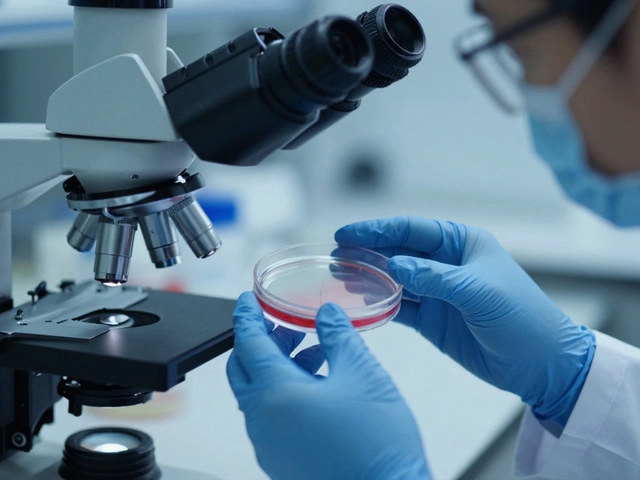Living with diabetes is a journey that entails constant monitoring and management. With its prevalence around the globe, finding effective ways to tackle this condition has been a priority for healthcare professionals and researchers alike.
Recently, thrilling advancements have emerged in the field of diabetes treatment and management, offering fresh hope to millions. These developments range from novel medications to innovative technologies that simplify the everyday challenges faced by those with diabetes.
In this article, we will explore these exciting breakthroughs and what they mean for diabetes care. By understanding these new options, individuals can arm themselves with knowledge and potentially transform their health journey.
- Understanding Diabetes
- Recent Advances in Medication
- Innovative Glucose Monitoring
- Lifestyle Changes and Their Impact
- Patient-Centric Approaches
- Future of Diabetes Management
Understanding Diabetes
Diabetes is a chronic health condition that affects how your body turns food into energy. The root of the issue lies in insulin, a hormone made by the pancreas that helps glucose from food get into your cells to be used for energy. When insulin production is impaired or ineffective, glucose can't enter the cells and accumulates in the blood, leading to high blood sugar levels. Over time, high blood sugar can cause serious health problems, such as heart disease, vision loss, and kidney disease. There are three main types of diabetes: Type 1, Type 2, and gestational diabetes. Type 1 is an autoimmune condition where the body's immune system attacks insulin-producing cells. Type 2, which is the most common, occurs when the body doesn't use insulin properly. Gestational diabetes occurs during pregnancy and usually resolves after childbirth. Each type presents unique challenges, yet advances in diabetes treatment are creating new opportunities for management.
The global burden of diabetes is staggering. According to the International Diabetes Federation, approximately 537 million adults were living with diabetes in 2021, and it's expected to rise significantly if current trends continue. In addition, about 1.5 million individuals are diagnosed with diabetes each year. Understanding the landscape is crucial, as many people live with diabetes undiagnosed, often leading to complications that could have been prevented with early intervention. Interestingly, while lifestyle choices like diet, exercise, and weight management are vital in managing Type 2 diabetes, genetic factors can also play a significant role in one's susceptibility to the disease. Knowing one's family history can be a catalyst for early diagnosis and prevention strategies, which forms a critical part of diabetes management.
The biological mechanisms behind diabetes are complex, yet understanding them is essential for crafting effective treatments. Insulin resistance, a hallmark of Type 2 diabetes, occurs when muscle, fat, and liver cells do not respond well to insulin and can't easily take up glucose from the blood. As a result, the pancreas tries to keep up with the increased demand for insulin by producing more. Over time, it fails to maintain the balance, leading to Type 2 diabetes. Interestingly, ongoing research has shone light on factors such as stress, hormones, and even gut bacteria in influencing insulin activity. This deeper understanding has paved the way for new diabetes medication aimed at improving insulin function and reducing insulin resistance. According to Dr. Susan Jebb from the University of Oxford, "While lifestyle changes are integral to managing diabetes, medical treatments are essential for those who need additional support in controlling their blood sugar levels."
While Type 1 diabetes is primarily driven by genetic factors, environmental triggers such as viruses may play a role in initiating the autoimmune process. Managing this type of diabetes requires a lifetime of daily insulin therapy to achieve blood sugar control. Continuous glucose monitors and insulin pumps represent technological advances that have transformed management strategies for those with Type 1, reducing the risks of severe highs and lows in blood sugar. Innovations in technology are not just limited to Type 1, as Type 2 diabetics are also benefiting from these breakthroughs. The advent of innovative glucose monitoring systems has simplified daily life for many, offering real-time data and insights that were once a challenge to obtain.
Living with diabetes is not merely a personal challenge, as it affects families and communities at large. With a profound social and economic impact, over a trillion dollars is spent annually on managing this condition worldwide. Recognizing diabetes as a significant global health challenge has rallied international efforts to invest in education, research, and more accessible and affordable treatments. Schools, workplaces, and communities are becoming better equipped with facilities and programs designed to support individuals managing diabetes. As awareness grows, so does the commitment toward addressing diabetes at systemic levels, ensuring that effective care and management strategies are within reach for all. To foster this ecosystem of support, it’s crucial that those affected have access to the latest information, medications, and lifestyle resources to help them along their journey.
Recent Advances in Medication
Over the past few years, there have been notable strides in tackling diabetes through innovative drug therapies. The introduction of these new diabetes treatment options offers improved efficacy and convenience, heralding a new era in diabetes management. One of the most promising developments is the advent of SGLT2 inhibitors. These drugs work by preventing the kidneys from reabsorbing glucose back into the blood, leading to excess glucose being expelled through urine. By helping to lower blood sugar levels, SGLT2 inhibitors not only improve glycemic control but also contribute to weight loss and lower blood pressure, adding a multifaceted approach to diabetes care.
Another exciting breakthrough in the realm of diabetes medication is GLP-1 receptor agonists. These drugs, often administered via injection, mimic the incretin hormones produced by the body to stimulate insulin secretion in response to meals. Unlike traditional insulin or oral medications, GLP-1 receptor agonists have the added benefits of slowing down gastric emptying and promoting satiety, helping patients manage their appetite and reduce overall calorie intake. This dual action can prove particularly beneficial for those with type 2 diabetes struggling with obesity.
Continuous efforts in pharmacology have also seen the emergence of dual and triple agonists, combinations that target multiple metabolic pathways simultaneously. These agents are setting a new standard in diabetes care, offering superior blood sugar control and potentially reducing cardiovascular risks associated with the disease. Clinical trials have demonstrated their ability to lower HbA1c levels significantly while also contributing to weight loss and cholesterol management. "Innovation is the cornerstone of modern diabetes treatment," an editorial in the Journal of Clinical Endocrinology & Metabolism noted, emphasizing the continuous pursuit of better outcomes for patients.
"As we explore these new therapies, we move closer to a future where diabetes is less of a burden and more of a manageable condition," they conclude.
Furthermore, the integration of these medications with traditional therapies is providing personalized treatment plans tailored to individual needs and responses. Because diabetes presents differently across the population, such customized approaches are vital. In some cases, combining newer drugs with established treatments like metformin leads to enhanced efficacy, providing a more robust defense against the complexities of diabetes. These advances signify an important shift towards precision medicine in the treatment of diabetes, ensuring that patients receive care that is as unique as their own metabolic circumstances.
The recent breakthroughs in diabetes medication offer renewed optimism for both patients and healthcare providers. With each discovery, the path to controlling diabetes becomes less arduous, promising a future where managing the disease is not only possible but highly effective. As ongoing research continues to yield new insights, these advancements hold promise for improved quality of life for millions living with diabetes around the world. By embracing these innovations, we stand at the cusp of a revolution—a critical step towards transforming diabetes management into a streamlined, successful endeavor.

Innovative Glucose Monitoring
The world of glucose monitoring has seen a phenomenal transformation in recent years, leaving behind the days of cumbersome test strips and painful finger pricks. With innovative glucose monitoring solutions, people with diabetes can now enjoy greater convenience and accuracy in their daily lives. The development of Continuous Glucose Monitors (CGMs) has been groundbreaking. These devices provide real-time glucose data with minimal invasiveness, fostering more proactive diabetes management.
CGMs like the Dexcom G6 and Abbott's FreeStyle Libre system have set a new standard for convenience and efficiency. They use tiny sensors inserted under the skin to measure glucose levels in the interstitial fluid, sending the data straight to a smartphone or dedicated device. This method allows for continuous tracking, making it easier to spot patterns and trends, which is crucial for maintaining stable glucose levels. Many users report a significant reduction in the need for traditional finger sticks, making the CGM a game-changer in terms of comfort and accessibility.
"These devices are not just a tool, they are a lifeline for people dealing with diabetes," says Dr. Sarah Johnson, a leading endocrinologist at St. Mary's Hospital. "The ability to monitor without constant pricking reduces the physical burden and psychological stress of diabetes management."
Another innovative stride in diabetes management is the integration of Artificial Intelligence (AI) with glucose monitoring technology. AI-driven applications can analyze the continuous stream of data from CGMs, offering personalized insights and recommendations. They predict changes in glucose levels based on trends, previous patterns, and user activities. This means individuals can receive alerts before they experience a high or low, allowing them to take preventive measures without the necessity of constant monitoring.
Investments in wearable technology have further enhanced glucose monitoring. Many smartwatches are now equipped with capabilities to sync with CGMs, providing discreet yet informative alerts and reports. These advances make it possible for those with diabetes to go about their daily routines with less interruption and more confidence in their health. Some of these devices come with customizable alarms for glucose swings, ensuring that users stay informed about their condition even through the busiest of days.
Looking towards the future, there's ongoing research aimed at developing non-invasive glucose monitoring techniques. Researchers are exploring the use of optical sensors and new bio-sensing technologies that could potentially eliminate the need for any form of skin penetration. If successful, this could open up a new chapter in glucose monitoring, making it even easier for people to keep track of their health.
| Device | Company | Features |
|---|---|---|
| Dexcom G6 | Dexcom | Realtime monitoring, smartphone integration, no fingersticks |
| FreeStyle Libre | Abbott | Sensor-based, minimal pain, 14-day wear |
In conclusion, the advancements in glucose monitoring technology not only improve diabetes management but also grant individuals a greater sense of autonomy and control over their well-being. These innovations not only signify a step forward in technology but also a shift in how diabetes is managed psychologically and socially. As technology progresses, the hope is to simplify the management of diabetes further, ensuring that everyone can lead healthy and fulfilling lives.
Lifestyle Changes and Their Impact
When it comes to managing diabetes, medication isn't the only player on the field. In fact, lifestyle changes can have a dramatic effect on both preventing and managing diabetes. These changes often involve diet modifications, exercise routines, and behavioral adjustments that pack a punch against the complications of diabetes. The beauty of lifestyle interventions is their dual benefit—they promote general well-being while specifically addressing diabetes management.
Studies show that dietary adjustments can significantly impact blood sugar levels. A diet rich in whole grains, vegetables, and lean proteins alongside limited saturated fats and sugars is often recommended. This approach to eating, often referred to as the 'diabetes plate method', can steer individuals towards better nutritional habits while keeping their glucose levels in check. Moreover, portion control and meal timing play roles that shouldn’t be overlooked—eating smaller, more frequent meals helps to stabilize blood sugar levels more effectively than three large meals each day.
Exercise, as it turns out, isn't just about maintaining weight. Regular physical activity, whether it's a brisk walk, cycling, or strength training, helps muscles use insulin more efficiently. This, in turn, lowers blood sugar levels over time. In fact, combining both aerobic exercises with resistance training shows even better outcomes. Incorporating just 30 minutes of movement most days of the week can have profound effects, enhancing the effectiveness of diabetes medication and overall health.
Psychological and Social Factors
The impact of lifestyle modifications isn't restricted to just physical changes. Emotional well-being plays a crucial role in diabetes management. Stress, for example, can be both a result and a cause of blood sugar fluctuations. Techniques such as mindfulness meditation and yoga have been shown to reduce stress, which can positively affect blood sugar levels. Building a strong support system, whether through family, friends, or support groups, also bears significance.
"The doctor of the future will give no medicine but will instruct his patient in the care of the human frame, in diet, and in the cause and prevention of disease," Thomas Edison once wisely predicted. These words resonate strongly when considering today's lifestyle approaches to managing diabetes effectively.
All these lifestyle adjustments depict the power of proactive measures in managing diabetes. The focus isn't purely on blood sugar levels but on improving life quality. As individuals embark on this path, it's crucial to remember that each lifestyle choice makes a difference and contributes to the bigger picture of holistic health.
Small Changes, Big Differences
Even tiny steps in the right direction can yield big rewards. For instance, studies have shown that losing as little as 5% of body weight can lead to significant improvements in blood glucose levels. This might mean committing to a gradual weight loss journey, emphasizing consistency over immediate results. Monitoring blood glucose regularly, understanding what affects different individuals, and tweaking habits accordingly can also go a long way in effective management.
| Lifestyle Change | Potential Impact |
|---|---|
| Diet Adjustments | May lower HbA1c by 1 to 2% |
| Regular Exercise | Can improve insulin sensitivity |
| Stress Reduction | Potential to stabilize blood sugar fluctuations |
These days, a paradigm shift is underway where people with diabetes are encouraged to take an active role in their treatment. The emphasis on lifestyle changes ushers in a new era of autonomy, where individuals can shape their own experiences. This progression toward self-management isn’t just empowering—it's essential in enabling better outcomes and fostering independence.

Patient-Centric Approaches
In recent years, the concept of patient-centric care has gained traction within diabetes treatment paradigms. This approach is all about placing the needs, preferences, and voices of patients at the heart of their healthcare. By personalizing treatment plans and fostering active engagement, this method ensures patients are empowered and autonomous in their management of diabetes. It's not a one-size-fits-all strategy; instead, it's deeply tailored, recognizing that each individual's journey with diabetes is unique. This recognition has led to a fundamental shift in how care providers interact with patients, focusing on listening and customizing solutions to better fit individual lifestyles and challenges.
One of the keys to a patient-centric approach is shared decision-making. This involves patients and healthcare providers working together to choose tests, treatments, and care plans based on clinical evidence balanced with a patient's preferences and values. By doing this, it translates medical jargon into understandable language and includes patients directly in the conversation. According to Dr. James Anderson, a leading figure in innovative diabetes care, "Patients who feel heard and understood are more likely to adhere to their medication regimens and lifestyle recommendations."
This quote underscores how pivotal effective communication is in patient-centric approaches, transforming the dynamic from a directive to a collaboration.
Integrating Technology with Human Touch
With advancements in technology, patient-centric care has reached new heights. Remote glucose monitoring devices, mobile health apps, and telemedicine platforms are shaping how care is delivered. These tools, when combined with the attentive guidance of healthcare professionals, provide a seamless blend of convenience and personalized attention. Such devices enable continuous tracking of blood sugar levels, feeding data back to both patients and their care teams. This real-time feedback loop helps in making immediate adjustments to treatment plans, if necessary. Additionally, technology extends the healthcare team's reach, as consultations are no longer limited to in-office visits, allowing for greater support across different locations and times.
A crucial aspect of this blend is the integration of emotional support through counseling or support groups facilitated by these platforms. Diabetes management isn't just about managing metrics; it's also about handling the emotional and mental burden the disease carries. By addressing these elements simultaneously, a well-rounded, patient-centric model is likely to lead to better outcomes and improved quality of life. In fact, recent studies have shown that when patients receive this holistic support, HbA1c levels—a critical indicator of diabetes management—tend to improve significantly.
| Aspect | Traditional Care | Patient-Centric Care |
|---|---|---|
| Decision Making | Doctor-led | Shared with patient |
| Technology Use | Minimal | Integrated with treatment |
| Emotional Support | Seldom addressed | Integral to care |
Ultimately, by focusing on the human element and using the strength of technology, patient-centric approaches offer a transformative path forward for diabetes management. This not only empowers individuals living with diabetes but also builds an environment where care is more responsive, adaptive, and personalized to cater to the diverse needs of patients today.
Future of Diabetes Management
The horizon for diabetes treatment is rapidly expanding, offering a bright future filled with technological advancements and innovative solutions that were once the stuff of dreams. Scientists and medical professionals are pouring immense resources into uncovering new ways to understand and tackle this complex condition. One of the most exciting areas of future development lies in the realm of precision medicine, which promises personalized care tailored to the unique genetic makeup of an individual. By understanding a person's distinct genetic profile, doctors can potentially predict the onset of diabetes and customize treatments that suit specific needs, thereby improving effectiveness and outcomes.
The development of artificial pancreas systems is another groundbreaking innovation that's on the verge of transforming diabetes management. These systems aim to automate blood glucose control, significantly reducing the daily management burden faced by patients. With the integration of continuous glucose monitors (CGMs) and insulin pumps, such systems can simulate the function of a healthy pancreas, maintaining optimal blood sugar levels with minimal intervention. This progression heralds a notable shift towards a more automated, seamless diabetes management experience.
"We are witnessing a paradigm shift in diabetes treatment, where technology and medicine are converging to create smarter, more effective solutions," says Dr. Sarah Thompson, a leading endocrinologist.
Nanotechnology also holds a promising future for those with diabetes. Imagine nanosensors coursing through your bloodstream, continuously monitoring glucose levels with precision beyond current capabilities. These nanosensors could signal insulin release mechanisms, responding instantly to changes in glucose levels and preemptively averting any imbalance. This innovation could potentially eliminate the need for daily finger prick checks and insulin injections that patients currently endure.
As technology pushes boundaries, a holistic approach to diabetes care is also gaining traction. Researchers are exploring the integration of mental health support with physical health interventions. Studies have shown that stress and mental health profoundly impact blood sugar levels and overall management of diabetes. Initiatives like diabetes-specific support groups and digital therapy apps are now being actively researched and developed to support mental well-being, which in turn aids better physical health outcomes.
In the realm of diet and lifestyle, future prospects include personalized nutrition plans powered by artificial intelligence that analyze an individual's metabolic response to different foods. Based on data collected, AI could recommend a diet that optimizes blood sugar control, making meal plans more efficient and effective than ever. This creates a new frontier where lifestyle interventions are as precise and personalized as medical treatments themselves.
These exciting advancements suggest that the future of diabetes breakthroughs will not only make management more efficient but will dramatically enhance the quality of life for millions globally. The journey is just beginning, but with each step forward, there's a tangible sense of progress towards a future where diabetes can be managed more effortlessly than today. With ongoing research and investment, this optimistic future is closer than ever before.









